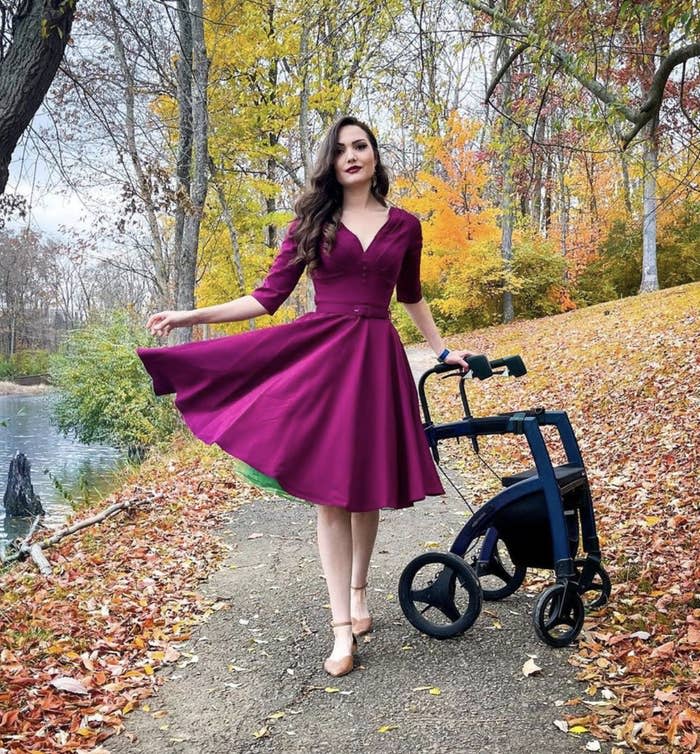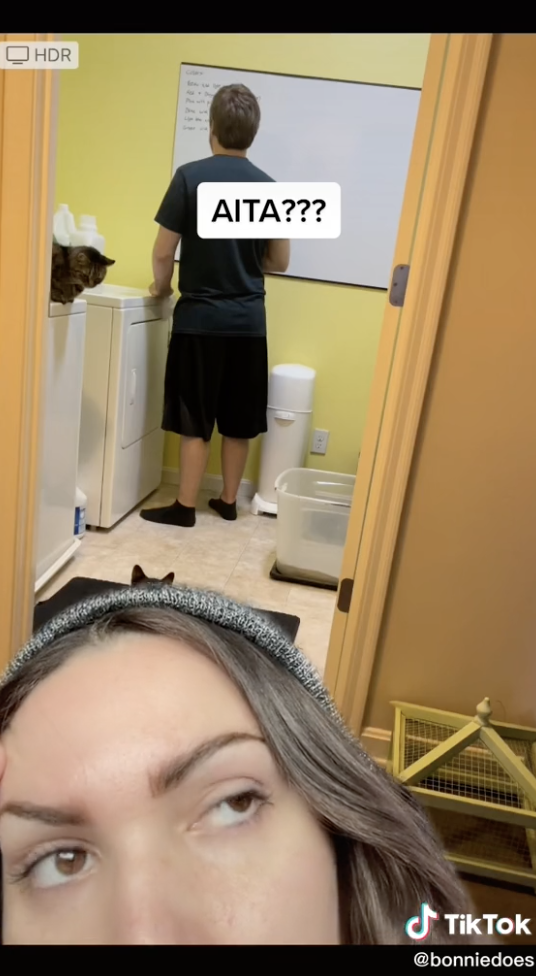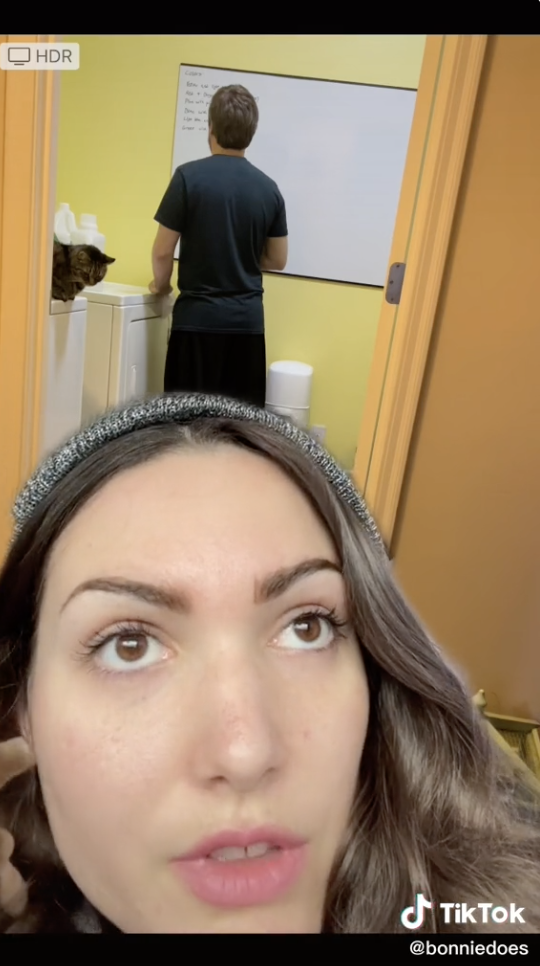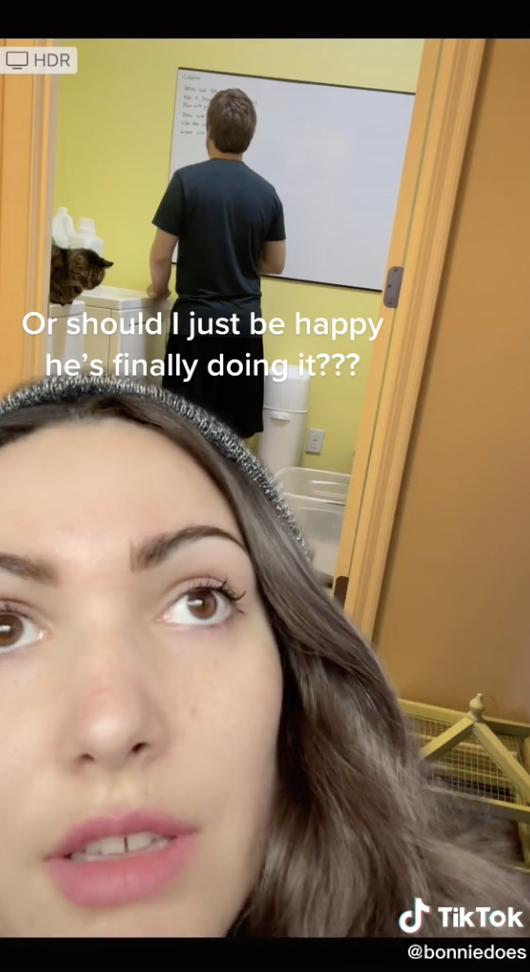This Woman's Viral Argument With Her Husband Over Laundry Has Started A Conversation About Ableism In Relationships
Bonnie is a 31-year-old disability advocate and student from the Midwest who's been "disabled to some extent [her] entire life."

She told BuzzFeed, "I was born with several genetic disorders, but some of the signs and symptoms of those disorders did not present until around age 10, and some of them didn't become severely disabling until my late teens and early 20s. I live with a connective tissue disorder, multiple neurological conditions, a brain injury, and many other comorbidities that relate to those conditions."

"My disabilities affect every system of my body and every facet of my life, but I do not define myself solely by them."

Bonnie is also married, and she recently went viral on TikTok for sharing the ongoing conflict she's had with her husband about his "inability" to do laundry correctly:
@bonniedoes #greenscreen and EVERYTHING is like this. I’m so…. Tired. #aita #amitheaswhole
? original sound - bonniedoes
In the video, Bonnie explains that "for the millionth time," she's had to teach her 33-year-old husband how to do their laundry properly. Because every time he does it, he "totally bungles it" and claims he just can't do laundry. "Mind you, he can do it," Bonnie says in the video. "He's a perfect execution engineer."

Bonnie further explains that years ago, she suggested they put up a whiteboard with laundry instructions, so her husband could have a guide for how to do it. For years, he ignored that idea, until recently, when their marriage counselor suggested the exact same thing. Meanwhile, Bonnie still had to tell him exactly what to write on the whiteboard, even though she's been telling him the same thing over and over for years.

She closes the video by asking, "Do I have a right to be annoyed and angry that it took him this long to do it, and then as soon as someone else suggests it, he falls all over himself and does it, and then wants a cookie for doing it?"

Bonnie's TikTok inspired thousands of comments, and many people agreed that, yes, Bonnie DOES have a right to be upset:



And some even went so far as to call her husband's antics a perfect example of "weaponized incompetence":
*For those who don't know, weaponized incompetence is a concept that's been gaining traction on TikTok in the last few years. It refers to when someone pretends to not know how to do a task, or purposely does it wrong, so that someone else will do it for them instead.


Bonnie told BuzzFeed that she decided to share the video during a time of great "revelation" in her life: "As a disabled partner, I realized that I'd been accepting the bare minimum (and sometimes less than that) due to both internalized and external ableism. It's been a very rough six or seven years medically for me, and my ability levels have changed a lot. Toss in a few brain surgeries, multiple abdominal and spine surgeries, almost dying twice, heaps of stress, and ableist people telling me I was just 'lucky' he didn’t leave me when it got bad, and I had the perfect recipe for some pretty hefty ableist guilt."
@bonniedoes Reply to @claudibird who woulda guessed internalized ableism? Not me for once ?? #ableism #internalizedableism
? original sound - bonniedoes
"I felt so badly for 'putting him through' all of that fear, exhaustion, and stress of watching me suffer, and all the unknowns, that I felt like I had to 'make up' for it."

"So, I did. I bent over backwards trying to make things as easy as possible for my husband. Even in my hardest moments — traveling multiple times for life-saving surgeries — I handled everything. I felt like I needed to compensate for being disabled, to compensate for the stress, to compensate for him not getting to do 'normal couple' things. Most couples took vacations; we travelled for surgeries."

And after years of overcompensation, Bonnie told BuzzFeed she finally realized how fruitless it was. "It hit me one day just how much I was doing, and it hit me how little he noticed what I was doing. I was killing myself to keep him comfortable, when my comfort had never been considered. So, I started asking for help (something I have GREAT difficulty doing). And when I asked for help, I didn’t get any."
Starz
"I was met with excuses and 'I don’t knows' far too often. I was tired of being the responsible one. I was tired of always being switched 'on.' So, mostly out of frustration, but also because I was doubting myself, I shared that video. I was looking for validation, but I was also looking for other partners to commiserate with."
In regard to the "weaponized incompetence" comments, Bonnie said, "I mostly agree. Obviously for us, and our relationship, it goes a little deeper, though. I explained in subsequent videos that it is never just about the laundry. It’s about seeing and anticipating your partner’s needs. It’s about seeing that your partner is struggling, knowing they need help because they’ve asked for it, and still doing nothing. It’s about putting the burden on your partner to 'manage' you."
@bonniedoes Reply to @gnatamebit it took me too long to realize what being supportive actually meant.
? original sound - bonniedoes
"Things like weaponized incompetence are much more than the 'lazy husband' trope. Knowingly letting your partner struggle and hurt for your own comfort is awful. It’s selfish. And judging by the videos that have hundreds of millions of views on the subject on TikTok, it’s a BIG issue."
Bonnie told BuzzFeed that her video also serves as an example of how disabled people often expect and/or accept less from their able-bodied partners, which "stems from society telling us we are worth less. We’re told necessities like medical devices, accessible spaces, and medical care are often 'too hard' or 'too expensive' to have. If we can’t work and can’t participate in capitalism like able-bodied people, then we’re a 'drain' that way too. We’re told that we're 'lucky' our partners stay when we become more ill (or we’re told we’re lucky we have them at all)."

"There should be no praise for staying with your sick partner," she said. "That’s part of the deal. I am in no way discounting the fact that having a sick partner is hard. It is, and there's time and space to talk about that too. But if the only thing your partner is contributing to your relationship is their physical presence, it’s not enough. I fooled myself into thinking it was."

For anyone dealing with something similar in their own relationship, Bonnie had this advice: "Stop begging. Stop asking. Stop pleading. Stop giving away every little piece of yourself because you feel like you are worth less because of your physical ability. Your worth as a partner and as a person has NOTHING to do with your ability. You don’t have to 'make up' for who you are. Your disability is not an excuse to treat you as less-than... State your needs. Firmly. Don’t sugarcoat everything. Your partner is an adult — communicate with them accordingly."
ABC
And finally, "If you’re a disabled partner reading this, you are worth it a thousand times over. Don’t accept less."
